Maintaining hormonal balance is key for good health. Hormones control many body functions, like metabolism and reproduction. An imbalance can cause mood swings, weight gain, and fertility issues.
You can help your body’s hormone production by eating nutrient-rich foods. Some foods are good for hormone health, helping to keep your hormones in balance.
By choosing hormone balancing superfoods and focusing on nutrition for hormone health, you can help keep your hormones balanced. In this article, we’ll look at the top superfoods for hormonal health, based on the latest nutrition science.
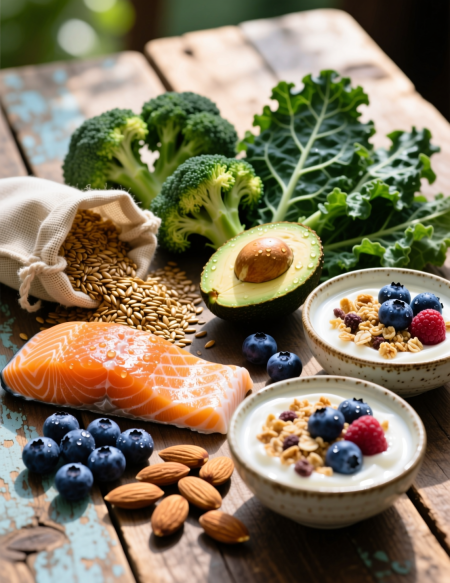
The Science of Hormonal Balance and Your Health
Hormonal balance is key to your health, affecting many body functions. Hormones are like chemical messengers, controlling growth, metabolism, and more. Keeping hormones in balance is vital for your overall health.
How the Endocrine System Regulates Your Body
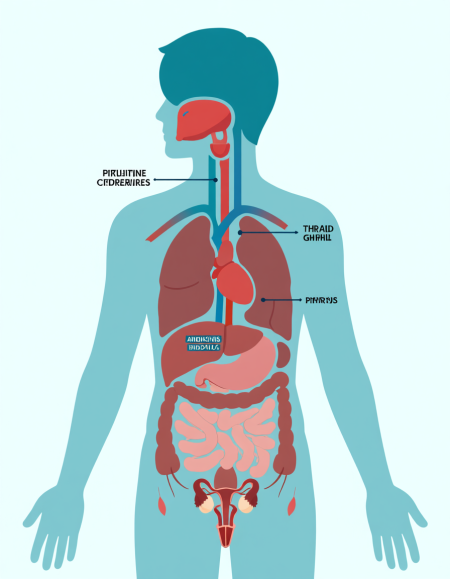
The endocrine system, made up of glands and organs, makes hormones that control body functions. The pituitary gland and hypothalamus are crucial in managing this system. Knowing how it works helps spot imbalances. A hormone balancing diet can help the endocrine system.
The thyroid, adrenal glands, and pancreas also play important roles. They produce hormones that affect metabolism, stress, and blood sugar.
Common Signs of Hormonal Imbalance

Spotting hormonal imbalance signs is the first step to fixing issues. Symptoms include fatigue, mood swings, and weight changes. Eating foods that balance hormones naturally can help. Also, trying natural remedies for hormone imbalance might help.
Other signs are sleep problems, skin issues, and changes in menstrual cycles or libido. Knowing these signs helps you take action for hormonal balance.
The Powerful Connection Between Diet and Hormones
Your diet greatly affects your hormonal health. It’s important to know how food interacts with your endocrine system. The foods you eat are key to hormone production, regulation, and balance.
How Food Influences Hormone Production and Function
The nutrients from your diet affect your endocrine glands. Eating the best foods for hormonal health helps hormones work right. Omega-3 fatty acids in fatty fish support hormone production. Leafy greens give minerals like magnesium, important for hormone balance.
Knowing what to eat for hormonal balance means focusing on nutrient-rich foods. A diet full of vegetables, fruits, lean proteins, and healthy fats helps your endocrine system.
The Impact of Nutritional Deficiencies on Hormonal Health
Nutritional gaps can mess with hormone balance. Lack of vitamin D can change hormone production. Not enough zinc can hurt thyroid function. Adding hormone balancing superfoods to your diet can help. Getting enough nutrients is crucial for hormonal health.
By choosing the right foods and eating a variety of whole foods, you can boost your hormonal health and overall well-being.
Essential Nutrients That Support Hormonal Balance
To keep your hormones in balance, it’s key to know the nutrients you need. Your diet affects hormone production a lot. Eating the right foods helps keep your hormones balanced.
Critical Vitamins for Hormone Synthesis
Vitamins like Vitamin D and B vitamins are very important. Vitamin D helps control genes that make hormones. B vitamins are needed for making steroid hormones. Getting enough of these vitamins helps your hormones stay healthy.
Minerals That Optimize Endocrine Function
Minerals like zinc and selenium are also crucial. Zinc keeps the thyroid gland healthy. Selenium protects endocrine glands from harm. Eating foods rich in these minerals helps your hormones work better.
The Role of Healthy Fats in Hormone Production
Healthy fats, especially omega-3s, are important for hormones. They help cells, including those in the endocrine system, work right. Adding healthy fats to your diet supports hormone balance.
Knowing and using these nutrients in your diet helps your hormonal health. This keeps you feeling good overall.
Superfood #1: Flaxseeds – Nature’s Estrogen Balancers
For women looking to balance their hormones, flaxseeds are a great choice. They are packed with omega-3 fatty acids and lignans. These nutrients support hormonal health and overall well-being.
The Science Behind Flaxseed Lignans
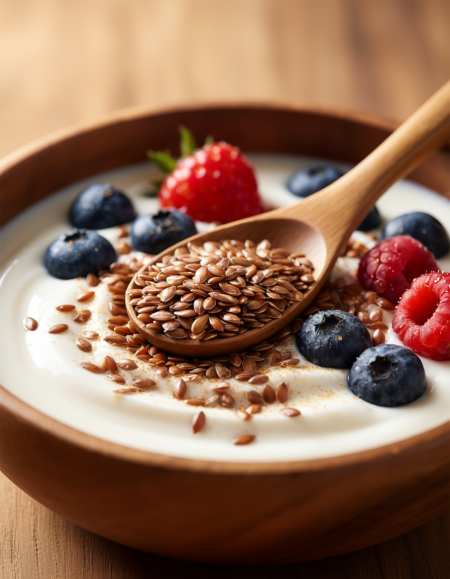
Flaxseeds have lignans, a type of phytoestrogen. They can bind to estrogen receptors, helping balance estrogen levels. Research shows lignans may reduce symptoms of hormonal imbalances.
Flaxseed lignans can mimic or block estrogen in the body. This makes them great for supporting hormonal balance.
Research-Backed Benefits for Hormonal Health
Studies show flaxseeds improve hormonal health. They can reduce PMS and menopause symptoms. Flaxseed lignans also support the endocrine system.
Adding flaxseeds to your diet can improve hormonal balance. This leads to better overall health.
Practical Ways to Add Flaxseeds to Your Diet
It’s easy to add flaxseeds to your diet. Sprinkle ground flaxseeds on oatmeal or yogurt. Blend them into smoothies or use them in baked goods. Ground flaxseeds are better absorbed.
Start with one tablespoon a day and increase as needed. Drink plenty of water with flaxseeds for digestive health.
Superfood #2: Fatty Fish – Omega-3 Powerhouses for Hormone Production
Fatty fish are a superfood that helps support hormone health with their omega-3s. They are key to a hormone balancing diet. Adding them to your meals can greatly improve your hormonal health.
Best Fish Sources and Their Nutrient Profiles
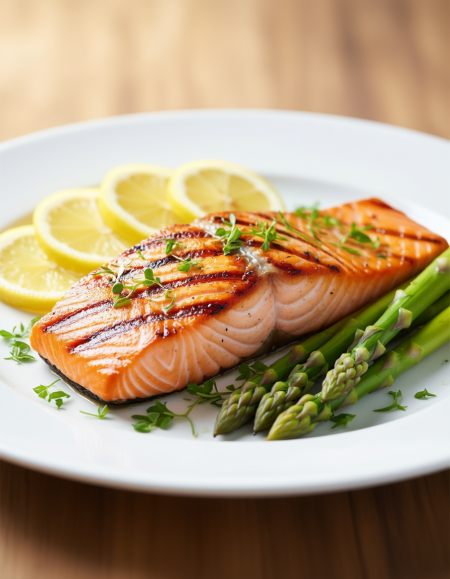
Salmon, sardines, and mackerel are top choices for hormone health. They are packed with omega-3 fatty acids, like EPA and DHA. These are vital for omega-3s for hormone health. Salmon also has lots of vitamin D, which helps control hormones.
- Salmon: High in omega-3s and vitamin D
- Sardines: Rich in omega-3s and calcium
- Mackerel: Excellent source of omega-3s and vitamin B12
How Omega-3s Regulate Hormonal Pathways
Omega-3s in fatty fish are key to hormone regulation. They help make and work hormones, keeping the endocrine system balanced. Eating fatty fish helps your body keep hormone levels right, which is good for your health.
Optimal Consumption Guidelines and Preparation Methods
Eat fatty fish at least twice a week for the best benefits. Grilling, baking, or poaching keeps the nutrients in. Don’t fry them, as it adds bad stuff and extra calories. By eating fatty fish often, you’re helping your hormones stay in balance.
Superfood #3: Cruciferous Vegetables – Detoxifiers for Estrogen Balance
Cruciferous vegetables like broccoli, kale, and cauliflower are great for estrogen balance. They are nutritional powerhouses that help keep hormones healthy.
The Unique Compounds in Broccoli, Kale, and Cauliflower

These veggies have special compounds that help balance hormones. Glucosinolates turn into indole-3-carbinol and sulforaphane in our bodies. These help detoxify the liver and balance estrogen levels.
- Broccoli is full of vitamins C and K, and fiber, making it a nutrient-dense choice.
- Kale is packed with antioxidants and calcium, supporting overall health.
- Cauliflower is versatile and contains compounds that support the body’s natural detoxification processes.
Clinical Evidence for Hormone-Balancing Effects
Research shows that eating cruciferous veggies can improve hormonal balance. They may lower the risk of hormone-related cancers and support endocrine health. Adding these foods to your diet is key for nutrition for hormone health.
Cooking Methods That Preserve Hormonal Benefits
To get the most benefits from these veggies, cook them right. Steaming or light sautéing is best. It keeps the nutrients that help balance estrogen. Don’t overcook, as it can lose a lot of nutritional value.
By adding cruciferous veggies to your meals and cooking them well, you can use them as hormone balancing superfoods. They support your hormonal health and overall well-being.
Superfood #4: Avocados – Healthy Fats for Steroid Hormone Synthesis
Avocados are full of healthy fats and important nutrients. They are great for a hormone-balancing diet. They help make steroid hormones, which is good for your endocrine health.
Avocado’s Unique Nutrient Profile and Hormonal Impact
Avocados have monounsaturated fats that help make hormones like estrogen and testosterone. These fats also help the endocrine glands, like the adrenal glands and thyroid. Plus, avocados have fiber, vitamins, and minerals that help with hormone health.
The nutrients in avocados help make hormones. The healthy fats in them are key for making steroid hormones. These hormones are important for many body functions, like reproduction and handling stress.

Delicious Ways to Incorporate Avocados Daily
Adding avocados to your daily meals can be tasty and easy. You can put sliced avocado on toast, blend it into smoothies, or use it on salads. Here are some ideas:
- Add avocado slices to your omelets or breakfast burritos
- Make a guacamole dip for vegetables or whole-grain crackers
- Blend avocado into your favorite smoothie recipe for a creamy texture
- Use avocado as a healthy substitute for mayonnaise in sandwiches
By eating avocados, you support healthy fats for hormone production and get more nutrients. As a top superfood for women’s hormones, avocados help keep hormones in balance.
Superfood #5: Adaptogenic Herbs – Cortisol Regulators for Stress Response
Adaptogenic herbs are powerful superfoods that help balance hormones. They regulate cortisol, the stress hormone, which is key for your well-being. These herbs offer a natural way to manage stress and support your adrenal function.
The Science of Adaptogens and Adrenal Function
Adaptogenic herbs affect the HPA axis, which controls stress response. They help your body adapt to stress, boosting resilience and well-being.
Top Adaptogens: Ashwagandha, Rhodiola, and Holy Basil

Some top adaptogenic herbs are:
- Ashwagandha: It lowers cortisol and boosts stress tolerance.
- Rhodiola: It improves mental performance and reduces fatigue.
- Holy Basil: It has antioxidants and supports adrenal function.
Safe Usage Guidelines and Potential Interactions
Follow safe usage guidelines for adaptogenic herbs. Start with low doses and watch your body’s reaction. Be cautious of interactions with medications like blood thinners and diabetes meds. Always talk to a healthcare professional before using these herbs, especially if you have health issues or are pregnant/breastfeeding.
Superfood #6: Fermented Foods – Gut Microbiome Support for Hormonal Health
Fermented foods are key for hormonal balance because they are rich in probiotics. They help keep the gut healthy. This is important for hormone balance.
The Gut-Hormone Axis: Scientific Evidence
Studies show that the gut microbiome affects hormone levels. It does this by controlling inflammation and making vitamins. A healthy gut is vital for hormone balance.

Best Probiotic-Rich Foods: Yogurt, Kefir, Kimchi, and Kombucha
Some top probiotic-rich foods are:
- Yogurt: Rich in Lactobacillus and Bifidobacterium strains
- Kefir: A fermented milk product with a diverse probiotic profile
- Kimchi: A spicy Korean fermented vegetable dish rich in vitamins and probiotics
- Kombucha: A fermented tea drink containing a variety of beneficial bacteria and yeast
Eating these foods can help keep your gut healthy. This is important for hormonal balance and overall health.
Creating a Microbiome-Friendly Meal Plan
To get the most from fermented foods, eat a variety of whole foods. This means:
- Adding fermented foods to your meals
- Eating different fruits and vegetables
- Choosing whole grains and lean proteins
By eating in a way that supports your gut, you can help your body stay in hormonal balance naturally.
Superfood #7: Leafy Greens – Magnesium and B Vitamins for Hormone Regulation
Adding leafy greens to your diet is a smart move for hormonal health. These greens are full of magnesium and B vitamins. These nutrients are key for making and controlling hormones.
Nutritional Benefits of Various Leafy Greens
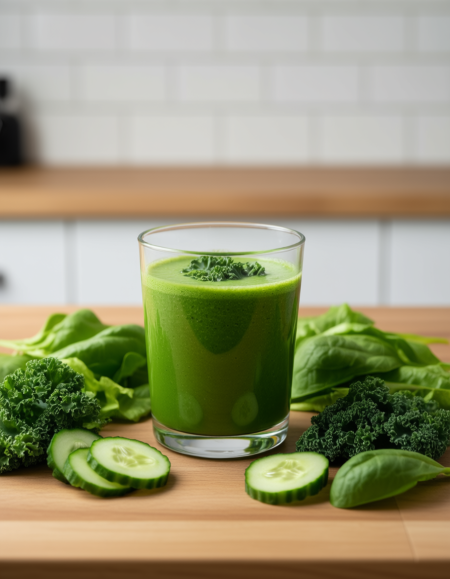
Leafy greens come in different types, each with its own health perks. For example, spinach is loaded with magnesium. This mineral helps keep cortisol levels in check and aids in stress management. Kale is also a big player, offering vitamin B6. This vitamin is vital for hormone creation.
Let’s look at the benefits of each:
- Spinach: Rich in magnesium, supports cortisol regulation.
- Kale: Rich in vitamin B6, supports hormone synthesis.
- Collard greens: High in folate, supports overall hormonal health.
Optimal Preparation and Consumption Strategies
To get the most from leafy greens, how you prepare them matters. Steaming or sautéing keeps more nutrients than boiling. Adding lemon juice boosts the absorption of minerals like magnesium.
It’s easy to add leafy greens to your meals:
- Add spinach to your morning smoothie.
- Sauté kale with garlic as a side dish.
- Use collard greens in soups or stews.
By eating a variety of leafy greens and cooking them right, you help your hormones stay in balance.
Superfood #8: Nuts and Seeds – Zinc and Selenium for Thyroid Function
Nuts and seeds are great for thyroid health because they have zinc and selenium. These minerals help your thyroid gland make hormones. These hormones control your metabolism and energy. Eating different nuts and seeds can give you the nutrients your thyroid needs.
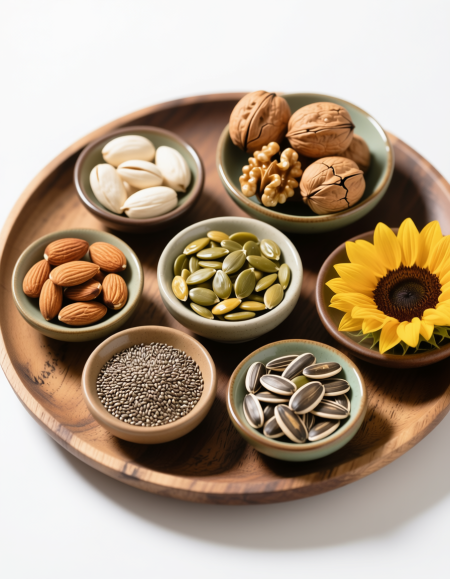
Specific Nuts and Seeds for Different Hormonal Needs
Each nut and seed has its own benefits for hormones. Brazil nuts have lots of selenium, which helps turn T4 into T3. Pumpkin seeds are full of zinc, which helps your immune system and makes thyroid hormones. Sunflower seeds and chia seeds also offer selenium and omega-3 fatty acids.
You can choose nuts and seeds based on your hormonal needs. For example, eating more brazil nuts can help your thyroid during stress.
Portion Control and Preparation for Maximum Benefits
Even though nuts and seeds are good for you, eat them in moderation because they have a lot of calories. A good amount is about 1 ounce (28 grams) or a handful. Soaking or roasting them can make them easier to digest and more nutritious.
To get the most from nuts and seeds, add them to your meals and snacks. You can sprinkle them on salads, mix them into smoothies, or just eat them as a snack. This way, you help your thyroid and balance your hormones.
Superfood #9: Berries – Antioxidant Protection for Endocrine Glands
Berries are full of antioxidants, which help protect the endocrine glands. These small fruits are rich in vitamins, minerals, and phytochemicals. Eating different berries can help keep your hormones in balance.
Research on Berries’ Impact on Hormonal Health
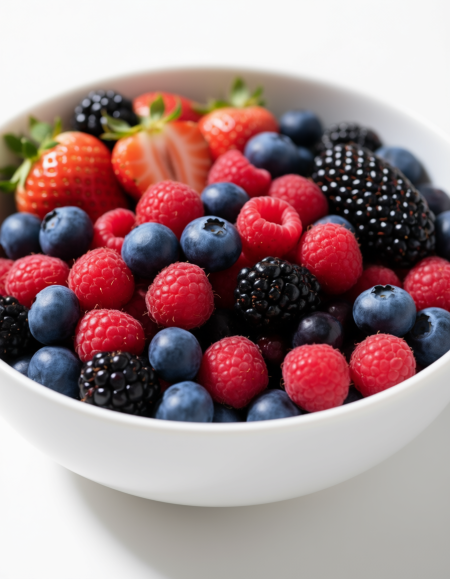
Studies show that berries are full of antioxidants. Blueberries, strawberries, and raspberries are especially good for hormones. Their antioxidants, like anthocyanins and ellagic acid, fight inflammation and support endocrine health.
One study found that eating blueberries can improve insulin sensitivity. This is key for healthy blood sugar levels. Another study showed that strawberries can reduce inflammation and oxidative stress. Eating a variety of berries can give you the most benefits.
Seasonal Guide to Incorporating Various Berries
To get the most from berries, eat them when they’re in season. Berries are available all year, making it easy to add them to your meals. Here’s a guide to help you:
- Spring: Strawberries and blueberries are in season in the spring. Enjoy them fresh or in salads and smoothies.
- Summer: Raspberries, blackberries, and boysenberries are at their best in summer. Use them in desserts, salads, or as a topping.
- Fall: Cranberries are a fall favorite. Enjoy them fresh, dried, or as juice.
- Winter: While fresh berries are scarce in winter, frozen berries are great in smoothies, baked goods, or on oatmeal.
By following this guide and eating a variety of berries, you can support your hormonal health and overall well-being.
Superfood #10: Quality Proteins – Essential Amino Acids for Hormone Synthesis
Quality proteins are key for hormone balance in our diet. They are made of amino acids, which are the building blocks of hormones. Eating enough quality proteins helps our bodies make hormones well.
Complete Protein Sources and Their Hormonal Effects

Complete proteins have all nine essential amino acids our bodies can’t make. Animal sources like lean meats, fish, eggs, and dairy are good. Plant-based options like quinoa and buckwheat also work.
These proteins help make hormones by giving the body what it needs. For example, tyrosine is key for thyroid hormones, and tryptophan helps make serotonin. Serotonin affects mood and hunger.
Eating a variety of complete proteins helps balance hormones. Grass-fed beef has omega-3s and CLA, which help hormones. Wild-caught salmon is also great for protein and omega-3s, which fight inflammation and support hormones.
Optimal Protein Timing for Hormonal Balance
When we eat protein matters for hormone balance. Eating protein all day keeps blood sugar steady and helps hormones. Try to have protein at every meal to keep amino acids flowing.
For best hormone balance, eat protein at key times. Like after waking up or after working out. A protein shake with whey protein after exercise helps muscles recover and hormones. Eating eggs or Greek yogurt for breakfast helps control hunger and metabolism all day.
Creating Your Personalized Superfoods for Hormonal Balance Plan
We’ve looked at the top 10 superfoods for hormonal balance. Now, it’s time to make a plan that includes these foods. This way, you can help balance your hormones and improve your health.
7-Day Meal Plan Featuring All 10 Hormone-Supporting Foods
Here’s a 7-day meal plan with all 10 hormone-balancing superfoods. It’s flexible, so you can change it to fit your taste and needs.
- Monday: Breakfast – Greek yogurt with berries and walnuts; Lunch – Grilled salmon with avocado and spinach
- Tuesday: Breakfast – Smoothie with flaxseeds, banana, and almond milk; Lunch – Turkey lettuce wraps with cruciferous vegetables
- Wednesday: Breakfast – Omelette with mushrooms and spinach; Dinner – Grilled chicken with roasted broccoli and quinoa
- Thursday: Breakfast – Avocado toast with poached eggs; Lunch – Lentil soup with kale and whole grain bread
- Friday: Breakfast – Smoothie bowl with banana, spinach, and almond milk topped with nuts and seeds; Dinner – Grilled shrimp with roasted asparagus and brown rice
- Saturday: Breakfast – Overnight oats with berries and chia seeds; Lunch – Grilled chicken Caesar salad
- Sunday: Breakfast – Breakfast burrito with scrambled eggs, black beans, and avocado; Dinner – Baked chicken with roasted Brussels sprouts and sweet potatoes
This meal plan shows how easy it is to add hormone-balancing superfoods to your diet.
Adjustments for Specific Hormonal Concerns (PCOS, Menopause, Thyroid)
While the meal plan above is a good start, some hormonal issues need special attention. For example, women with PCOS might benefit from foods rich in omega-3s and antioxidants like fatty fish, flaxseeds, and berries. Those going through menopause might find relief in foods high in calcium and vitamin D, like leafy greens and fortified dairy. People with thyroid issues should eat foods rich in iodine, like seaweed and iodized salt, and selenium, found in Brazil nuts.
By making these specific changes, you can tailor your meal plan to support your hormonal balance and address your health concerns.
Foods to Avoid That Disrupt Hormonal Harmony
You might be eating foods that mess with your hormones without knowing it. This can cause health problems. The link between what we eat and our hormones is complex. Some foods can really affect our endocrine system.
The Science Behind Common Endocrine Disruptors in Food
Endocrine disruptors are chemicals that mess with our hormone system. They can cause problems with growth, reproduction, and metabolism. These chemicals are in many foods, thanks to farming and food processing.
Common disruptors include bisphenol A (BPA), phthalates, and perfluorinated compounds (PFCs). They’re in food packaging and non-stick coatings. Foods with these chemicals are often processed or wrapped in plastic.
Knowing which foods have these chemicals helps you choose better. This way, you can avoid foods that might harm your health.
Healthier Substitutions for Hormone-Disrupting Foods
There are healthier options for foods that might have endocrine disruptors. Instead of processed meats, try organic, grass-fed options. Choose fresh, locally sourced produce over canned goods.
For cooking, use cast iron or stainless steel cookware instead of non-stick pans. These changes can help lower your exposure to harmful chemicals. Always read food labels for “BPA-free” or “non-toxic” to make the best choices for your health.
Lifestyle Factors That Enhance the Benefits of Hormone-Balancing Foods
Getting your hormones in balance is more than just what you eat. It’s about a whole lifestyle change. Eating the right foods is key, but other lifestyle choices matter a lot too.
Sleep Optimization for Hormonal Regulation
Quality sleep is vital for hormonal balance. Your body uses sleep to manage hormones that control growth and metabolism. To sleep better, stick to a routine, avoid caffeine and screens before bed, and relax before sleep.
Stress Management Techniques That Support Endocrine Health
Too much stress can mess with your hormones by upsetting the HPA axis. Activities like meditation, yoga, or deep breathing can help. Doing these regularly can boost your endocrine system’s health.
Exercise Patterns That Complement Hormonal Nutrition
Exercise is also key for hormonal balance. It affects hormone levels like insulin and growth hormone. A mix of cardio, strength training, and flexibility exercises is best. But, too much exercise can be bad.
Conclusion: Nourishing Your Body for Hormonal Wellness
Achieving hormonal wellness is about more than just food. It’s about a balanced diet and a healthy lifestyle. Adding the top 10 superfoods for hormonal balance to your meals is a big step. It helps nourish your body and supports your endocrine system.
The path to hormonal wellness starts with knowing how food affects your hormones. Foods packed with omega-3s, vitamins, and minerals are key. They help keep your hormones in balance. By choosing the right foods, you help your body stay in harmony.
But it’s not just about what you eat. A healthy lifestyle is also important. This includes regular exercise, managing stress, and getting enough sleep. Together, these habits help you achieve and keep hormonal balance.
Begin your journey today. Add these superfoods and healthy habits to your daily life. See how nourishing your body can transform your hormonal wellness.
FAQ
What are the best foods for balancing hormones naturally?
Foods like fatty fish are great for balancing hormones because they’re full of omega-3s. Berries are also good because they’re packed with antioxidants. Eating cruciferous veggies, leafy greens, and avocados helps too.
How do nutritional deficiencies affect hormonal balance?
Not getting enough nutrients can really mess with your hormones. For example, not enough vitamin D can hurt your thyroid. And if you don’t have enough magnesium, your cortisol levels might get out of whack. So, it’s key to eat foods that give you all the nutrients you need.
Can diet alone fix hormonal imbalances?
Eating right is super important for your hormones, but it’s not the only thing. Sleep, managing stress, and exercise also play big roles. To really fix hormonal issues, you need a mix of good food, a healthy lifestyle, and sometimes supplements or doctor’s help.
What are some superfoods that support women’s hormonal health?
Flaxseeds are great for women because they help balance estrogen. Fatty fish are also good for your hormones because they’re full of omega-3s. Plus, foods like cruciferous veggies, avocados, and leafy greens are full of nutrients and antioxidants.
How can I incorporate hormone-balancing foods into my diet?
Start by adding foods like fatty fish, leafy greens, and cruciferous veggies to your meals. Healthy fats from avocados and nuts are good too. Planning your meals can help you get all the nutrients you need. A 7-day meal plan is a good place to start.
Are there any foods that can disrupt hormonal balance?
Yes, some foods can mess with your hormones. Avoid processed foods, too much soy, and foods with lots of sugar. Also, steer clear of foods with endocrine disruptors, like some plastics and pesticides.
How do adaptogenic herbs support hormonal health?
Herbs like ashwagandha, rhodiola, and holy basil help control cortisol and support your adrenals. This helps balance your hormones. You can take them as supplements or drink them as teas, but always follow the safe usage guidelines.
What role does gut health play in hormonal balance?
Your gut health is super important for your hormones. A healthy gut helps your endocrine system work right. Eating fermented foods like yogurt and kimchi can help keep your gut healthy and support your hormones.






